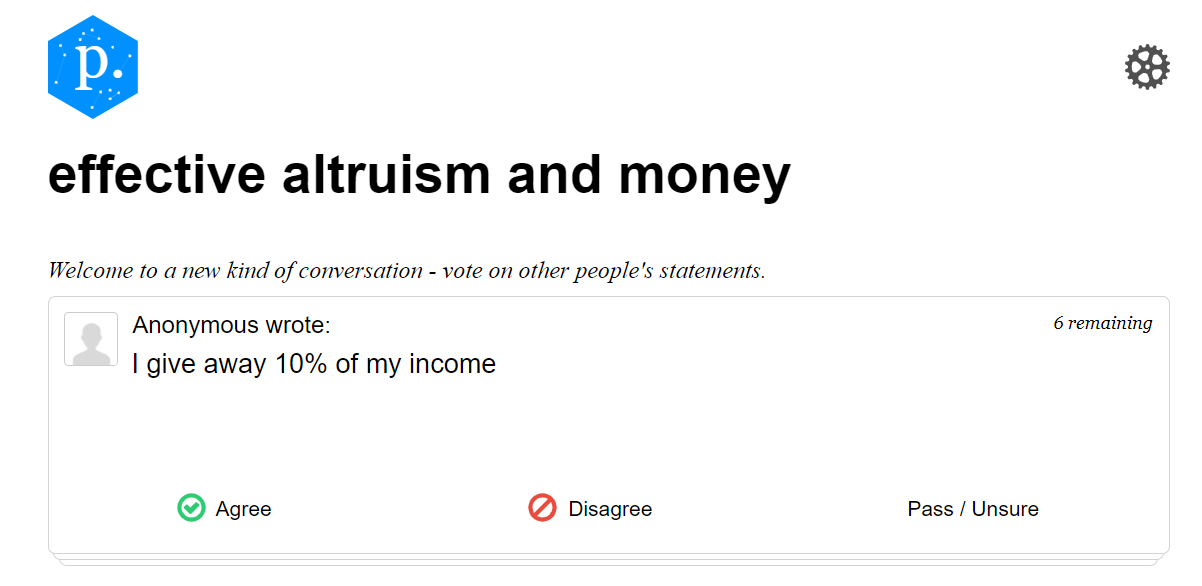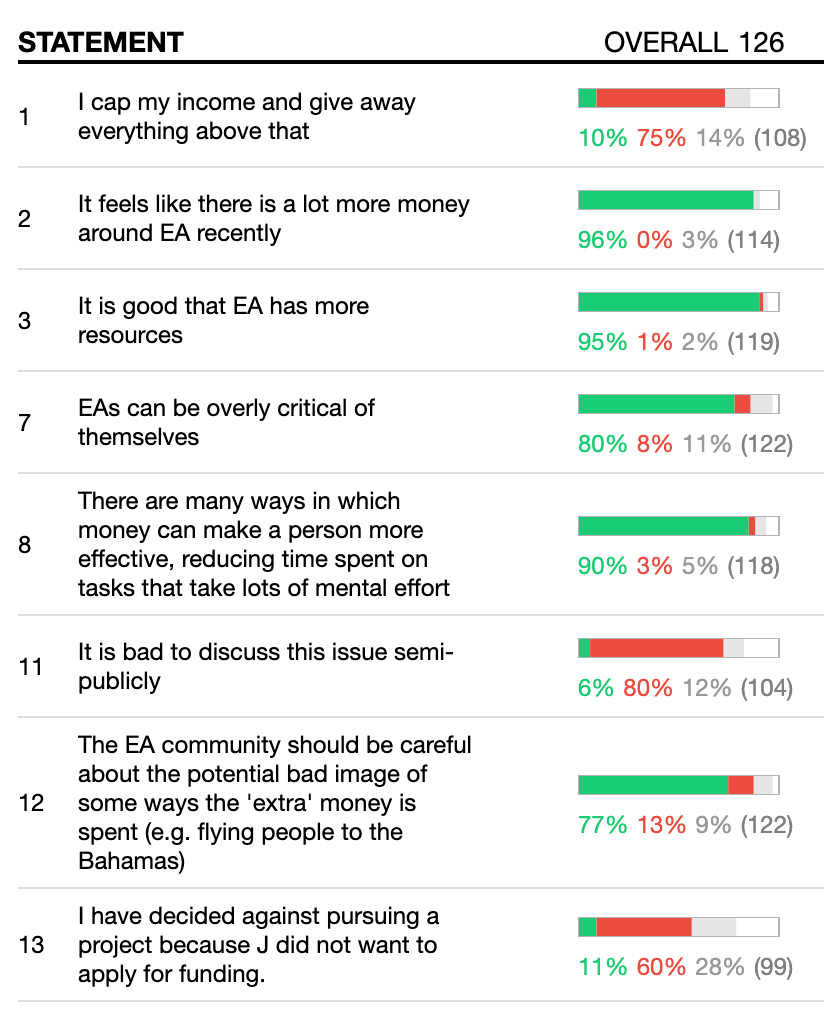Let's talk about the sharp increase in EA funding. I feel anxious about it. I don't think most of my feelings here are rational, but they do affect my actions, so it would be irrational not to take them seriously.
Some thoughts (roughly ordered from general to personal):
- More money is good. It means we have more resources to work on the world's most pressing problems. Yay
- I have seen little evidence that FTX Future Fund (FFF) or EA Infrastructure Fund (EAIF) have lowered their standards for mainline grants
- Several people have gotten in touch with me about regranting money and it seems it would be easier for the median EA to get say $10,000 in funding than it was a year ago. It's possible that this change is more to do with me than FFF though. And also, perhaps this is a good thing. I think it's positive EV to help well aligned people with finance to help them work on important projects faster.
- I'm really really really really grateful to EA Billionaries (in this case Sam Bankman-Fried) for working hard, taking risks and giving away money. I want to both express thanks and also say that working out how do deal with money as a community is important, reasonable work
- The joke "sign up to FTX Funds, I guess" is probably a bad meme. eg "I'm thinking of trying to learn to rollerblade" "sign up to FTX Future Fund?" suggests that FFF has a very low standard for entry. It is a good joke, but I don't think a helpful one.
- Perhaps my anxiety is that I feel like an imposter around large amounts of money - "you can't fund my project, I'm just me". As Aveek said on twitter, sometimes I feel "I wouldn't trust the funding strategy of any organisation that is willing to fund me". This is false, but sometimes I believe it, maybe you do to?
- Perhaps this anxiety is that I worry about EA being seen to be full of grifters. Like the person who is the wealthiest on their street, I don't want bad press from people saying "EAs are spendthrift". I don't think we are, but there is a part of the movement that does get paid more and spend more than many charity workers. I don't know what to do about this.
- My inner Stefan Shubert says "EA is doing well and this is a good thing, don't be so hard on yourself" and I do think there is a chance that this is unnecessary pessimism
- I talk about it on twitter here. I don't mind that I did this, but I think the forum is generally a better place to have the discussion than twitter. Happy to take criticism
- I have hang-ups about money in general. For several years after university I lived on about $12k a year (which is low by UK standards, though high by world ones). It's pretty surreal to be able to even consider applying for say 5x this as a salary. It's like going to a fancy restaurant for the first time ("the waiters bring the food to the table?") I just can't shake how surreal this all is.
- I think it's good to surface and discuss this but I'm open to the idea that it isn't and will blow over.
I've made a Polis poll here if you want to see how different views cluster





Yes, you need to measure value drift by other standards than live on little money. It may make sense that college students think that they can live on [12k/20k] forever but then they realize that 100k is also good, plus they can donate like 25% and still feel so achieved and have so many various services that enable them to focus on work and self-care they can just inspire others to also study hard/get outside of their comfort zones and maybe, after a few years of learning/interning/helping out, they can get to some 50/60k and even then they can donate if they feel like it and get used to getting the basic efficiency-improving services, which other people are happy to do, since it's a job [in the UK/paid in GBP]. [I may be confusing £ and $.] So, it may be optimal to pay people skilled in EA-related disciplines a slight decrease from what they would gain if instead of developing capacity to work commercially they spend substantial less-paid/unpaid time gaining EA-related capabilities, because they can focus, inspire, and also donate while not feeling bad about 'taking too much.'
There are different people and if you can 'legally/in an accepted way' pay for the change of institutional focus, you pay for the connections at the institutions. For example, if you'd like Harvard to become more interested in impact, you hire some people from Harvard, who could otherwise gain maybe $200k and they influence the institution through networks. This is great because academia influences the world order. You have also people who develop solutions and work for much less, such as the charity entrepreneurs, especially in nations with higher PP than the UK. Then you have the officers who run the solutions and work for very little, maybe someone can distribute nets for $2k/year or gladly liaise with local institutions for $0.2/hour in places of very high PP and especially poor other opportunities. You still need someone to coordinate them who can live in a relative peace, having some personal security/stability paid. So, not everyone is getting large sums.
The funds are welcoming with applications but try applying: your project needs to be especially promising in impact to gain funding. For example, if you want to roller blade, this can constitute a reputational loss risk for yourself (not really but may reduce the ability of fund managers in evaluating grants or not really but there may be other colleagues who can help you develop your project before you apply for funding) - of course it is a joke but the general reasoning applies. The funds' scopes enables self-selection of persons who have the ability to relatively independently solve some of the world's most important problems - it may be just a coincidence a lot are in EA (or just the thinking about effective impartial impact making is less prominent elsewhere). Thus, funds are highly selective.
You need some deference to established desiderata to not shove it into the faces of private and public companies that eh yes we just want to reduce your traditional power we think it is more enjoyable even for you but also importantly for everyone, because impact is just very cool and enjoyable: you would get blacklisted or incur reputational loss. Instead, you need to fund some companies that even contribute to the issues so that people focus on these, especially if they are controversial or/and aggressive in gaining attention, at least as a way to entertain the donors in the community who would otherwise think well it is dope to go to Mars and think what a shame even talk about poverty efficient solutions and inclusion, just every time someone brings up the topic I leave since I dislike momentum loss. Of course, there would be an issue if the money 'flies to Mars' year after year not only early on then just not so fun anymore. Therefore, it may be necessary to have fun giving to attention-captivating causes likeable by powerful individuals because it captivates their attention and participation.
The fund managers to an extent reflect the spirit of the community, so if you have an issue, it is probably due to a spirit in the community, which you should feel free to either bring up or consider brought up otherwise. Thus, fund managers are held accountable by the community to make good decisions so as to fly the money where they make the most positive inclusive impact.